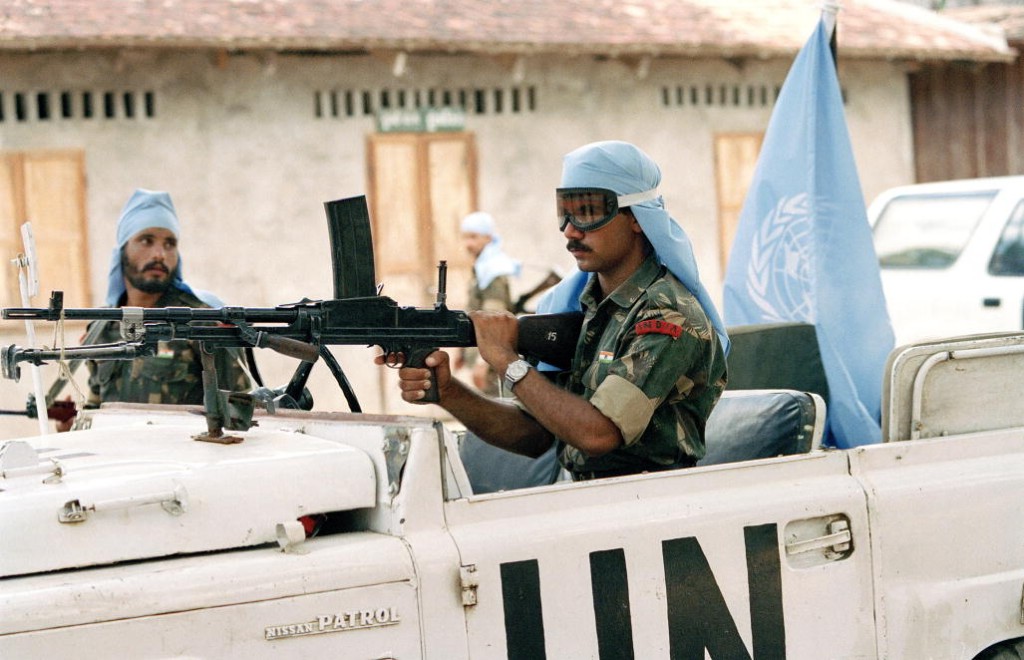
ទាហាន អ៊ុន តាក់ មកពីប្រទេសឥណ្ឌា កំពុងដើរល្បាតនៅតាមដងផ្លូវ ក្នុងខេត្តព្រៃវែង ប្រទេសកម្ពុជា នាថ្ងៃទី២នៃការបោះឆ្នោតជាតិ។ រូបភាព ថតដោយ អាជ្ញាធរបណ្តោះអាសន្នអង្គការសហប្រជាជាតិនៅកម្ពុជា (អ៊ុន តាក់) កាលពីថ្ងៃទី ២៤ ខែ ឧសភា ឆ្នាំ១៩៩៣។ ក្រោមអាជ្ញាប័ណ្ណ CC BY-NC-ND 2.0
ប្រទេសកម្ពុជា បានទទួលមរតកនៃប្រព័ន្ធច្បាប់ និងនយោបាយ និងរដ្ឋបាលសាធារណៈ ពីប្រទេសបារាំង។ព្រះរាជាណាចក្រមួយនេះ ស្ថិតនៅក្រោយអាណាព្យាបាលបារាំងនៅឆ្នាំ១៨៦៣ និងត្រូវដាក់ឲ្យស្ថិតនៅក្រោមអាណានិគមនិយមបារាំង នៅឆ្នាំ១៨៨៤។ នៅទី ៩ ខែវិច្ឆិកា ឆ្នាំ១៩៥៣ ប្រទេសនេះ ទទួលបានឯករាជ្យពីប្រទេសបារាំង។ បច្ចុប្បន្ន ប្រទេសកម្ពុជា ប្រកាន់យកប្រព័ន្ធច្បាប់ស៊ីវិល (មើលច្បាប់ និងតុលាការ) និងប្រព័ន្ធរដ្ឋបាល តាមបែបបារាំង។
ព្រះរាជាណាចក្រកម្ពុជា គឺជារដ្ឋមិនអាចបំបែកបាន។1 យោងទៅតាមរដ្ឋធម្មនុញ្ញ គោលការណ៍រាជានិយមអាស្រ័យរដ្ឋធម្មនុញ និងប្រជាធិបតេយ្យសេរីពហុបក្ស កំណត់ឲ្យប្រព័ន្ធរដ្ឋាភិបាលនៃប្រទេសកម្ពុជា។2 ខណៈដែល ព្រះមហាក្សត្រ ទ្រង់គ្រងរាជសម្បត្តិ ប៉ុន្តែមិនកាន់អំណាច3 សិទ្ធិនិងសេរីភាពជាមូលដ្ឋានរបស់ប្រជាពលរដ្ឋខ្មែរ4 ត្រូវបានទទួលស្គាល់ និងការពារ ហើយគណបក្សនយោបាយ ត្រូវបានជម្រុញឲ្យចូលរួមនៅក្នុងការបោះឆ្នោតកាន់តែច្រើន5។
អំណាចគ្រប់គ្រងរដ្ឋ ត្រូវបានបែងចែកដាច់ពីគ្នាជា អំណាចនីតិប្បញ្ញត្តិ អំណាចនីតិប្រតិបត្តិ និងអំណាចតុលាការ។ យោងទៅតាមមាត្រា ៥១ថ្មី នៃរដ្ឋធម្មនុញ្ញ រាជរដ្ឋាភិបាលនៃព្រះរាជាណាចក្រកម្ពុជា ដែលជាអង្គនីតិប្រតិបត្តិ និងនាយករដ្ឋមន្ត្រី ត្រូវបានហាមឃាត់មិនឲ្យអន្តរាគមន៍ចូលក្នុងកិច្ចការរបស់តុលាការ។ យ៉ាងណាមិញ មិនមានការបែងចែកមុខងារដាច់ស្រឡះ រវាងសមាជិកនៃគណៈរដ្ឋមន្ត្រី និងសមាជិកនៃរដ្ឋសភាទេ។6 ក្នុងន័យនេះ សមាជិកនៃរដ្ឋសភា ក៏អាចជាសមាជិកនៃគណៈរដ្ឋមន្ត្រី ដែលជាស្ថាប័នមានអំណាចបំផុតនៃអង្គនីតិប្រតិបត្តិផងដែរ។
អំណាចទាំងអស់ ជារបស់ប្រជាពលរដ្ឋខ្មែរ ប៉ុន្តែ ពួកគេអនុវត្តអំណាចទាំងនេះតាមរយៈរដ្ឋសភា ព្រឹទ្ធសភា រាជរដ្ឋភិបាល និងសាលាជម្រះក្តី។7 ប្រជាពលរដ្ឋ បោះឆ្នោតជ្រើសតាំងតំណាងរាស្ត្រដោយផ្ទាល់ នៅរៀងរាល់៥ឆ្នាំ8 និងសមាជិកព្រឹទ្ធសភា ដោយប្រយោល នៅរៀងរាល់៦ឆ្នាំ9 ចំណែកឯគណៈរដ្ឋមន្ត្រីត្រូវទទួលការគាំទ្រពីរដ្ឋសភា10 តាមរយៈការបោះឆ្នោតទុកចិត្ត។ តាមរយៈសំណើរបស់ឧត្តមក្រុមប្រឹក្សានៃអង្គចៅក្រម11 ចៅក្រម និងព្រះរាជអាជ្ញា ត្រូវបានតែងតាំង ព្យួរ និង បញ្ឈប់មុខងារ ដោយព្រះមហាក្សត្រ 12។
នៅរៀងរាល់ប្រាំឆ្នាំម្តង ប្រជាពលរដ្ឋខ្មែរ នឹងបោះឆ្នោតជ្រើសតាំងតំណាងរបស់ពួកគេ ដោយផ្ទាល់ ឬមិនផ្ទាល់ សម្រាប់រដ្ឋាភិបាលមូលដ្ឋាន។ អាស្រ័យទៅតាមការគ្រប់គ្រងតាមបែបវិមជ្ឈការ ឬវិសហមជ្ឈការ រដ្ឋាភិបាលមូលដ្ឋានមានស្វ័យភាពខាងរដ្ឋបាលក្នុងកម្រិតមួយពីរដ្ឋាភិបាលជាតិ ប៉ុន្តែរដ្ឋាភិបាលមូលដ្ឋាន នៅតែពឹងផ្អែកលើរដ្ឋាភិបាលជាតិ នៅក្រោមក្របខណ្ឌនៃបណ្តាញ និងធនធានហិរញ្ញវត្ថុ (មើល ការគ្រប់គ្រង)។
រដ្ឋាភិបាលជាតិ ត្រួតពិនិត្យ រដ្ឋាភិបាលមូលដ្ឋាន តាមរយៈក្របខណ្ឌច្បាប់និងស្ថាប័ន។13 បទប្បញ្ញត្តិណាដែលចេញដោយរាជរដ្ឋាភិបាល ក្រសួង និងស្ថាប័នជាតិ មានឋានានុក្រមខ្ពស់ជាងបទប្បញ្ញត្តិចេញដោយរដ្ឋបាលដែនដី។ ម្យ៉ាងទៀត ក្រសួង និងស្ថាប័នជាតិមានរចនាសម្ព័ន្ធគ្រប់គ្រងបន្ថែម នៅរដ្ឋបាលថ្នាក់ក្រោមជាតិ ក្រោមរូបភាពជា មន្ទីរ និងសាខា នៅរាជធានី និងតាមបណ្តាខេត្ត ស្រុក និងខណ្ឌ (មើល ក្រសួង និងស្ថាប័នរដ្ឋ)។
ទាក់ទងនឹងប្រព័ន្ធរដ្ឋាភិបាល
បច្ចុប្បន្នភាពចុងក្រោយ ថ្ងៃទី ២៨ ខែកញ្ញា ឆ្នាំ២០១៥
ឯកសារយោង
- 1. រដ្ឋធម្មនុញ្ញ, មាត្រា៣។
- 2. រដ្ឋធម្មនុញ្ញ, មាត្រា១។
- 3. រដ្ឋធម្មនុញ្ញ, មាត្រា៧។
- 4. រដ្ឋធម្មនុញ្ញ, មាត្រា៣៦។
- 5. រដ្ឋធម្មនុញ្ញ, មាត្រា៥១ថ្មី។
- 6. រដ្ឋធម្មនុញ្ញ, មាត្រា៧៩។
- 7. រដ្ឋធម្មនុញ្ញ, មាត្រា៥១ថ្មី។
- 8. រដ្ឋធម្មនុញ្ញ, មាត្រា៧៦ និង មាត្រា ៧៨។
- 9. រដ្ឋធម្មនុញ្ញ, មាត្រា១០០ថ្មី និង មាត្រា ១០២ថ្មី។
- 10. រដ្ឋធម្មនុញ្ញ, មាត្រា១១៩ថ្មី។
- 11. ច្បាប់ស្តីពីការរៀបចំនិងការប្រព្រឹត្តិទៅនៃឧត្តមក្រុមប្រឹក្សានៃអង្គចៅក្រម ប្រកាសឲ្យប្រើដោយព្រះរាជក្រមលេខ នស/រកម/០៧១៤/០១៧ ចុះថ្ងៃទី ១៦ ខែកក្កដា ឆ្នាំ២០១៤។ ទាញយកបានពី រដ្ឋសភា. “បញ្ជីច្បាប់៖ ច្បាប់នៅនីតិកាលទី៥.”។ ចូលអាននៅថ្ងៃទី ២៥ ខែសីហា ឆ្នាំ២០១៥, http://www.national-assembly.org.kh/ViewLawFile.aspx?LawDID=456
- 12. ច្បាប់ស្តីពីលក្ខន្តិកៈនៃចៅក្រម និងព្រះរាជអាជ្ញា ប្រកាសឲ្យប្រើដោយព្រះរាជក្រមលេខ នស/រកម/០៧១៤/០១៦ ចុះថ្ងៃទី ១៦ ខែកក្កដា ឆ្នាំ២០១៤។ ទាញយកបានពី រដ្ឋសភា. “បញ្ជីច្បាប់៖ ច្បាប់នៅនីតិកាលទី៥”។ ចូលអាននៅថ្ងៃទី ២៥ ខែសីហា ឆ្នាំ២០១៥, http://www.nac.org.kh/ViewLawFile.aspx?LawDID=455
- 13. រដ្ឋធម្មនុញ្ញ, មាត្រា១៤៥ថ្មី (មួយ) និង មាត្រា១៤៦ថ្មី (មួយ)។

